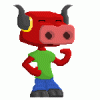What are the pros and cons of class based and open class RPG in game design and the ways to design open class RPG?
Most RPG is class based, it's a easy way to make a diversity game world. Personally I prefer open class RPG, I only know skill based design is open class design, is there another ways to implement open class design and any details of how to design open class RPG?
you can do it like wow e.g with talent trees, only that instead of having 3 talent trees per class have 20 talent trees that everyone has.
If you can do good balancing, it will be viable. And will allow more diverse builds e.g tank mages.
balance measures :
1) talent power increases the more points you put in the tree. Or some talents grant passive benefits to other talent trees to encourage "cross class" building.
2) instead of talent trees, you can have talent sets, e.g you can pick any talent instead of forcing player to buy some useless talents.
For example a warrior with 1 talent in heal with heal for only 30%+heal vs a specialised healer that heals for 100%+heal.
3) you can put more than 1 talent points on same talent, like in diablo 2. This will allow to create "weak-gimbed" builds that although do more damage than any other class, they suck in that they lack versality and do only 1 thing.
If you can do good balancing, it will be viable. And will allow more diverse builds e.g tank mages.
balance measures :
1) talent power increases the more points you put in the tree. Or some talents grant passive benefits to other talent trees to encourage "cross class" building.
2) instead of talent trees, you can have talent sets, e.g you can pick any talent instead of forcing player to buy some useless talents.
For example a warrior with 1 talent in heal with heal for only 30%+heal vs a specialised healer that heals for 100%+heal.
3) you can put more than 1 talent points on same talent, like in diablo 2. This will allow to create "weak-gimbed" builds that although do more damage than any other class, they suck in that they lack versality and do only 1 thing.
you can do it like wow e.g with talent trees, only that instead of having 3 talent trees per class have 20 talent trees that everyone has.
In Rift you have something like that. If I remember right you have like 8 talents trees from which you can choose 3 of them to create your class. Still can be considered as a class system but with much more freedom.
you can do it like wow e.g with talent trees, only that instead of having 3 talent trees per class have 20 talent trees that everyone has.
If you can do good balancing, it will be viable. And will allow more diverse builds e.g tank mages.
balance measures :
1) talent power increases the more points you put in the tree. Or some talents grant passive benefits to other talent trees to encourage "cross class" building.
2) instead of talent trees, you can have talent sets, e.g you can pick any talent instead of forcing player to buy some useless talents.
For example a warrior with 1 talent in heal with heal for only 30%+heal vs a specialised healer that heals for 100%+heal.
3) you can put more than 1 talent points on same talent, like in diablo 2. This will allow to create "weak-gimbed" builds that although do more damage than any other class, they suck in that they lack versality and do only 1 thing.
Thank you for your answer.
If the talent is obtained by player in gameplay (finish some quest etc.) not before the game really begin, I think it's open class design.
In real world, class is determined by related skill, knowledge and experience. In my mind, the open class design similar like this, with the talent system you mentioned, I have some ideas.
1.Every new player character have no class.
2.Skills are major factors determine the abilities of player.
3.Some special profession related trick can be obtained by quest etc..
4.These tricks can improve profession related skill or have special effect.
5.When get enough tricks, player can get a class title, it's just a name and depend on the tricks.
6.Some tricks are incompatible, so no one can get all tricks.
If the talent is obtained by player in gameplay (finish some quest etc.) not before the game really begin, I think it's open class design.[/quote]
It is often used in conjunction with a close class system and it still pretty restrictive in most cases (a rogue will always be a DPS class no matter what tree it takes). There are of course cases were it's used to give the player and idea of choice when they specialise their undefined class (Skyrim).
I personally like the predefined class system. It allows a player to decide what kind of character they want to play while allowing the designer to really make some big distinctions with the role and feel of the class in both story and gameplay. That seems to be missing somewhat from open class designs so far.
There is a happy medium (even if it has its own share of issue). The player first chooses a broad class say a melee class/magic class/ranged class. A few levels in they can then choose an "advanced class" in the case of the magic class this could be mage or priest. Further on you could specialise each class even more, the mage could be a wizard or warlock. By the end of the levelling experience the player should have been able to tailor their character in a way they like but while still getting the sense of purpose the closed class system provides.
[quote name='n00b0dy' timestamp='1328035487' post='4908106']
you can do it like wow e.g with talent trees, only that instead of having 3 talent trees per class have 20 talent trees that everyone has.
If you can do good balancing, it will be viable. And will allow more diverse builds e.g tank mages.
balance measures :
1) talent power increases the more points you put in the tree. Or some talents grant passive benefits to other talent trees to encourage "cross class" building.
2) instead of talent trees, you can have talent sets, e.g you can pick any talent instead of forcing player to buy some useless talents.
For example a warrior with 1 talent in heal with heal for only 30%+heal vs a specialised healer that heals for 100%+heal.
3) you can put more than 1 talent points on same talent, like in diablo 2. This will allow to create "weak-gimbed" builds that although do more damage than any other class, they suck in that they lack versality and do only 1 thing.
Thank you for your answer.
If the talent is obtained by player in gameplay (finish some quest etc.) not before the game really begin, I think it's open class design.
In real world, class is determined by related skill, knowledge and experience. In my mind, the open class design similar like this, with the talent system you mentioned, I have some ideas.
1.Every new player character have no class.
2.Skills are major factors determine the abilities of player.
3.Some special profession related trick can be obtained by quest etc..
4.These tricks can improve profession related skill or have special effect.
5.When get enough tricks, player can get a class title, it's just a name and depend on the tricks.
6.Some tricks are incompatible, so no one can get all tricks.
[/quote]
bluegobin, sounds like a good start for a `Open` Class System. I would just add the ability for the Player to create their own Classes in which they can label and organize skills into Templates that can be shared with other players.
[size=1]WIP: Super 3D Game Platform, [size=1]A New Genre: Tool Games (TOGs)
I still think MxO had one of the best approaches. It had a number class skill trees where you focused on a specific loadout to maximize your abilities but you could change your loadout at check points anytime you wanted.
- My $0.02
In the end, it all really comes down to execution and balance.
You can have class based systems where you have a lot of freedom and customization as well like Blue Dragon or Final Fantasy XIII.
And you can have skill based systems where all individuality is gone because you can literally make everyone the same (Final Fantasy XII), this is different however, from Final Fantasy X for example (you can make everyone the same but that only happens when you maxed everyone after endless hours) or Digital Devil Saga (everyone can get all skills, but everyone has very different stats).
Your approach sounds solid, though.
The title may be a good idea because you always end up labeling them.
"tank build", "healer/supporter build", "elemental mage build", in the end grouping them is convenient when they only differ by details.
You can have class based systems where you have a lot of freedom and customization as well like Blue Dragon or Final Fantasy XIII.
And you can have skill based systems where all individuality is gone because you can literally make everyone the same (Final Fantasy XII), this is different however, from Final Fantasy X for example (you can make everyone the same but that only happens when you maxed everyone after endless hours) or Digital Devil Saga (everyone can get all skills, but everyone has very different stats).
Your approach sounds solid, though.
The title may be a good idea because you always end up labeling them.
"tank build", "healer/supporter build", "elemental mage build", in the end grouping them is convenient when they only differ by details.
In Dungeon Seige II, you gain skills in whatever you use. However, the way the mechanics work, if you character dables in everything you become too weak to progress. I guess the issues all come down to balance.
This topic is closed to new replies.
Advertisement
Popular Topics
Advertisement
Recommended Tutorials
Advertisement







